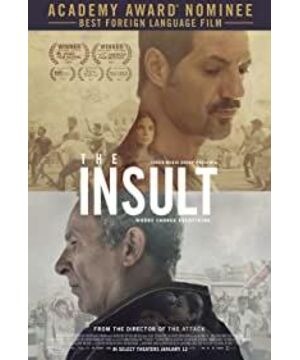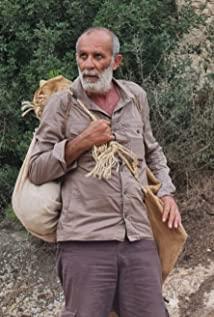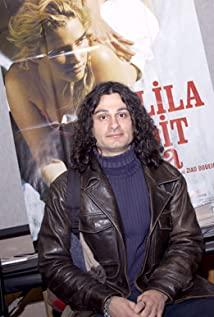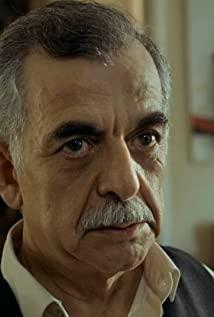The movie I want to recommend today is, to be honest, very unpopular.
Not much heard, less seen,
But after reading it, almost everything is said to be good.
This kind of unpopular film should not be known to so few people, so Xiong should take a wave of safety seriously——
Humiliate The Insult
Less than 1000 people have seen it.
Nominated for Best Foreign Language Film at the 90th Academy Awards.
It's unpopular mainly because it's a Lebanese film.
Many people don't even know the country of Lebanon, let alone the country's movies.
The film is inspired by a real-life experience of director Zed Doyle.
Zed Doyle once uttered discriminatory shaming words during an argument with a plumber.
The good friend kindly reminded him that "misfortune comes out of his mouth" and asked him to apologize. The plumber refused the director's admission, and the foreman almost fired the plumber for this.
This incident inspired Zed Doyle to create Dishonored.
Because to fully understand the film requires a lot of background knowledge about Lebanon and Palestine.
In order to help you understand the plot of the film, let's take a little time to introduce you to this Middle Eastern country - Lebanon.
Lebanon is a country in the Middle East, and one of the most different.
How should I put it, it is the only country in the Arab world that consists of two major religions, Islam and Christianity.
These two religious forces both want to control the state power. From the top leaders of the state to the residents at the bottom, they have been fighting for a long time. They have experienced 15 years of tragic civil war.
Not only internal worries, but also external problems.
As the conflict between Palestine and Israel escalated, the entire Middle East began to fight, and a large number of Palestinian Jewish refugees poured into Lebanon, adding chaos to the already chaotic Lebanon.
The story of this film takes place in this complex background.
One summer, in Beirut, the capital of Lebanon.
Tony (Adel Karam), a Christian resident in his home country, is driving home after listening to a political speech.
Tony runs a car repair shop and has an impending wife at home.
As usual, Tony was sprinkling water from the balcony hose, and the water accidentally spilled onto Yasser (Carmel Barsha) downstairs.
Yasser is an engineer who is in charge of leading a team to carry out the old city renovation project. His work is meticulous and rigorous, and he is deeply liked by the foreman.
If anything is bad, it's his identity: a Palestinian refugee.
As I said before, the natives of Lebanon are very hostile to Palestine refugees.
When Yasser went to find Tony, hoping to help him solve the problem with the water pipe, he did not expect his hot face to stick to his cold butt, and Tony stubbornly rejected Yasser.
In this way, Yasser repairs the drain without Tony's consent.
Tony found out and smashed the water pipe with a hammer.
Yasser felt that this was a humiliation to his work, and scolded "Bastard!" in anger.
Tony felt humiliated and angry, demanding that Yasser must apologize to him.
Otherwise they will sue their company.
The foreman persuaded Yasser to work on other people's grounds, make big things small, and make little things better.
But Yasser's silent attitude annoyed Tony.
Don't apologize, it's not over.
Naturally, the foreman didn’t want to make a big deal out of it. Hiring Palestinians is an illegal thing, and it’s not good for anyone if it gets bigger.
Yasir's wife also persuaded him to give in properly,
Yasser said, "We are the Arab niggas."
In one sentence, the Palestinians have no human rights and status in the Middle East.
But the reconciliation had to continue, and the next day the foreman and Yasser came to Tony's auto repair shop to prepare for reconciliation.
Tony humiliated Yasser with words in every possible way, until he uttered the sentence "It would be great if Sharon wiped you out from the beginning".
Sharon, the former prime minister of Israel, led the massacre of refugee camps.
We didn't feel anything when we heard this.
But for Palestinians, this is a nuclear-bomb-level insult.
In the end, Yasser couldn't take it anymore, and turned around with a punch, and Tony was broken two ribs.
It was originally just a dispute between two big men, because of their different identities, according to the words of the police:
This is a political case!
The courtroom scene after that is the core of the whole film, and there are three scenes in total.
In the first round, both parties appeared in court without a lawyer.
Under the judge's questioning, Yasser admitted his guilt, but refused to say why he beat Tony.
The two chose to remain silent, and the judge did not pursue the hasty acquittal of Yasser (despite his own admission of guilt).
Tony couldn't accept the verdict at all, and scolded and humiliated the judge.
Later, Tony collapsed due to a traumatic pneumothorax caused by a fractured rib, and his wife was born prematurely because of the incident.
Tony didn't expect that a humiliating remark would trigger such a strong butterfly effect, and even his wife and children were involved.
He hated this Palestinian so much that he had to appeal.
A barrister, Vajdi Webb, who had previously defended the prime minister, took over the case.
Tony just wanted an apology.
But when it comes to the Palestinian issue, any small detail will be magnified infinitely.
In the highly politicized Middle East, any abuse could rise to a political level, and Palestine would be seen as a vested interest deserving sympathy.
On the other side, a female lawyer came to find Yasser, hoping to defend him.
Coincidentally, the female lawyer was Wajdi's daughter.
In the second round, the two sides debated about Yasser's chest pain after beating Tony and a series of accidents involving his wife's premature birth.
Both parties tried their best, and their private lives were exposed in court.
The two wanted a "fair trial", but the focus of the entire trial is quietly shifting.
From a matter of two people, to two families, to religion, a conflict between native Lebanon and Palestinian refugees.
Ironically, the two parties lost their voice as the trial progressed.
The client became a bystander, and the quarrel between the two lawyers was exposed by the good media.
It was completely magnified into a social event.
Many Palestinian refugees took to the streets to protest, and the situation was spiraling out of control.
Public opinion is overwhelmingly on the side of Yasser.
Even the Prime Minister of Lebanon stepped in to mediate.
In the face of sincerity and stability, at the national level, the Prime Minister chooses the latter.
Tony felt desperate, he just wanted an apology, shouldn't it, is it that hard?
The two walked out of the prime minister's office. Yasser's car failed to catch fire. Tony, who had already driven away, turned back and helped Yasser repair the car, leaving Yasser with a complicated look on his face.
The final court trial is the climax of the whole film.
Tony's childhood has been made public, a past he doesn't want to talk about, and now the scar is ruthlessly uncovered.
In 1976, the Damour area where Tony was located was slaughtered in blood during the Lebanese civil war. Tony was the only survivor. There were also shadows of the Palestinian army in this massacre.
That's why Tony hates Palestinians.
Palestine refugees deserve sympathy, so don't people like Tony who survived the Holocaust deserve sympathy?
Everyone pays attention to refugees in other countries, but ignores refugees in their own country.
He owes him an apology as well as his homeland.
That night Yasser came to Tony and deliberately said something insulting to make Tony angry and beat Yasser.
Yasser finally said the "I'm sorry" that Tony wanted to hear the most.
Whatever the outcome of the final judgment is, it doesn't matter to them anymore.
After the case was closed, the two looked at each other and smiled, recalling that Yasser deliberately "looked for a fight" before, and their unique reconciliation method was heartwarming.
People can be reconciled, but the grievances and grievances between the two nations cannot be easily reconciled.
The quarrel between the two is like a small wound, and the wound is being torn bigger and bigger as the trial progresses.
The entire court trial seems to lead us to review the recent history of Lebanon.
Although we know very little about the history of the Middle Eastern country, we also admire the courage of the director to expose the scars of history.
What is even more rare is that the director is extremely restrained in the performance of the refugee issue, and does not earn cheap tears from the audience by consuming the suffering of Palestine refugees.
The whole film does not directly reveal the cruelty of the war, but after watching it, you will feel that the war is not only the number of casualties caused, but the invasion of the consciousness and life of every living person by the shadows left by the war.
Even more frightening is that this invisible invasion is persistent and irreversible.
We who were born in a peaceful era may not be able to feel the horror of war. Usually, the sentence "May the world be peaceful" is somewhat joking.
But there are still many people in this world who live a life full of gunfire, and peace has become their most extravagant wish.
The reconciliation between the two at the end of the film expresses the director's good hope for peace.
Religious issues, state-to-state issues, in the final analysis, are human issues.
But when will we humans truly understand each other?
Hope this day can come sooner.
Text / Fifty Kilogram Bears
"Barcelona Movie" WeChat public account (ID: MovieBase)
View more about The Insult reviews











